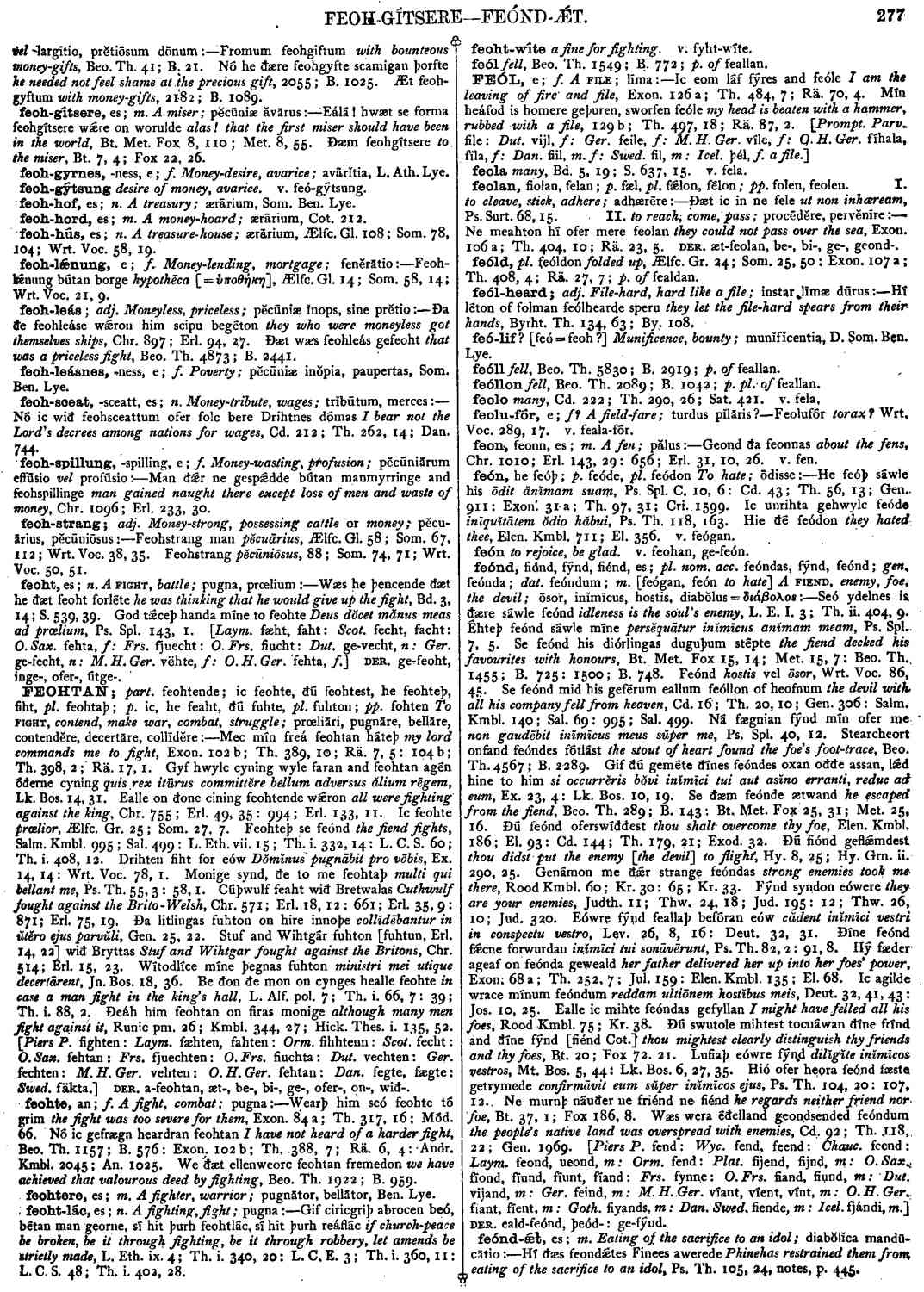feónd
- noun [ masculine ]
-
Seó ydelnes is ðære sáwle feónd
idleness is the soul's enemy,
- L. E. I. 3 ;
- Th. ii 404, 9.
-
Éhteþ feónd sáwle míne
persĕquātur inĭmīcus anĭmam meam,
- Ps. Spl. 7, 5.
-
Se feónd his diórlingas duguþum stépte
the fiend decked his favourites with honours,
- Bt. Met. Fox 15, 14 ;
- Met. 15, 7 ;
- Beo. Th. 1455 ;
- B. 725: 1500 ;
- B. 748.
-
Feónd hostis vel
ōsor,
- Wrt. Voc. 86, 45.
-
Se feónd mid his geférum eallum feóllon of heofnum
the devil with all his company fell from heaven,
- Cd. 16 ;
- Th. 20, 10 ;
- Gen. 306: Salm. Kmbl. 140 ;
- Sal. 69: 995 ;
- Sal. 499.
-
Ná fægnian fýnd mín ofer me
non gaudēbit inĭmīcus meus sŭper me,
- Ps. Spl. 40, 12.
-
Stearcheort onfand feóndes fótlást
the stout of heart found the foe's foot-trace,
- Beo. Th. 4567 ;
- B. 2289.
-
Gif ðú geméte ðínes feóndes oxan oððe assan, lǽd hine to him
si occurrĕris bŏvi inĭmīci tui aut asĭno erranti, reduc ad eum,
- Ex. 23, 4: Lk. Bos. l0, 19.
-
Se ðæm feónde ætwand
he escaped from the fiend,
- Beo. Th. 289 ;
- B. 143: Bt. Met. Fox 25, 31 ;
- Met. 25, 16.
-
Ðú feónd oferswiððest
thou shalt overcome thy foe,
- Elen. Kmbl. 186 ;
- El. 93: Cd. 144 ;
- Th. 179, 21 ;
- Exod. 32.
-
Ðú fiónd geflǽmdest
thou didst put the enemy [the devil] to flight,
- Hy. 8, 25 ;
- Hy. Grn. ii. 290, 25.
-
Genámon me ðǽr strange feóndas
strong enemies took me there,
Rood- Kmbl. 60 ;
- Kr. 30: 65 ;
- Kr. 33.
-
Fýnd syndon eówere
they are your enemies,
- Judth. 11 ;
- Thw. 24, 18 ;
- Jud. 195: 12 ;
- Thw. 26, 10 ;
- Jud. 320.
-
Eówre fýnd feallaþ befóran eów
cădent inĭmīci vestri in conspectu vestro,
- Lev. 26, 8, 16: Deut. 32, 31.
-
Ðíne feónd fǽcne forwurdan
inĭmīci tui sonāvērunt,
- Ps. Th. 82, 2: 91, 8.
-
Hý fæder ageaf on feónda geweald
her father delivered her up into her foes power,
- Exon. 68 a ;
- Th. 252, 7 ;
- Jul. 159: Elen. Kmbl. 135 ;
- El. 68.
-
Ic agilde wrace mínum feóndum
reddam ultiōnem hostĭbus meis,
- Deut, 32, 41, 43: Jos. 10, 25.
-
Ealle ic mihie feóndas gefyllan
I might have felled all his foes,
Rood- Kmbl. 75 ;
- Kr. 38.
-
Ðú swutole mihtest tocnáwan ðíne frínd and ðíne fýnd [fiénd Cot.]
thou mightest clearly distinguish thy friends and thy foes,
- Bt. 20 ;
- Fox 72, 21.
-
Lufiaþ eówre fýgd
dilĭgĭte inĭmīcos vestros,
- Mt. Bos. 5, 44, Lk. Bos. 6, 27, 35.
-
Hió ofer heora feónd fæste getrymede
confirmāvit eum sŭper inĭmīcos ejus,
- Ps. Th. 104, 20: 107 12.
-
Ne murnþ náuðer ne friénd ne fiénd
he regards neither friend nor foe,
- Bt. 37, 1 ;
- Fox 186, 8.
-
Wæs wera éðelland geondsended feóndum
the people's native land was overspread with enemies,
- Cd. 92 ;
- Th. 118, 22 ;
- Gen. 1969.
Bosworth, Joseph. “feónd.” In An Anglo-Saxon Dictionary Online, edited by Thomas Northcote Toller, Christ Sean, and Ondřej Tichy. Prague: Faculty of Arts, Charles University, 2014. https://bosworthtoller.com/10365.
Checked: 1